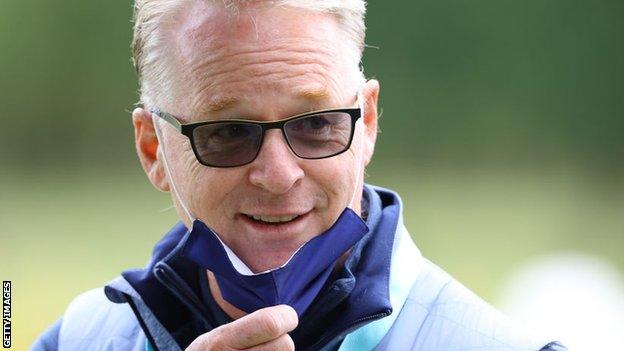European Tour and PGA Tour's 'strategic alliance' leaves more questions than answers
- Published
- comments

Canadian Keith Pelley was appointed chief executive of the European Tour in 2015
Promising to create "a significant new era for global golf" the "momentous" announcement of a strategic alliance between the European and PGA Tours has so far generated more questions than answers.
The collaboration between the two biggest professional circuits, announced by European Tour chief executive Keith Pelley, would appear to make plenty of sense for the worldwide game.
But what it will mean for players and fans is distinctly unclear. This is perhaps due to the speed with which the deal came to fruition last week.
It was not a huge surprise but the timing was not widely anticipated. A closer working relationship had been on the agenda for some time.
When I spoke to PGA Tour commissioner Jay Monahan in May 2018, he told told me: "I certainly think it is something that everybody who is involved in the game should be aspiring to.
"If you look at what's in the best interests of the fan, best interests of the players, you could make the case for one global tour."
The deal hammered out in three days of intense talks last week does not create a "world tour" but it brings that notion a step closer. It removes barriers between the two tours and makes cooperation an easier objective.
"The way I have characterised it is the PGA Tour moves from a competitor to a partner, and a partner where we will work to collaborate on a global golf schedule," Pelley said.
"Both in terms of prize funds and playing opportunities for our respective memberships and also in the commercial realm across the globe."
The tipping point seems to have been created by talks between the European Tour and Raine Group, a private equity firm behind the proposed Premier Golf League which threatened to shake up the status quo in men's professional golf.
The European circuit ultimately decided against jumping into bed with the rebel upstarts, preferring to align themselves with their American rivals as the PGA Tour became more willing partners.
The Florida-based tour would not have wanted the rebel PGL to gain a foothold of legitimacy in the professional game through an association with an established entity such as the European Tour.
Hence the coming together of two rival tours, the American one being the dominant force with greater resources, prize funds and the best players on board.
As a result the PGA Tour now has a minority stake in European Tour Productions, the Wentworth-based organisation's in house media company. Monahan takes a seat among 15 board members as well.
Pelley was insistent this is not a takeover nor a reflection of fragile finances in his group of companies. Such suggestions, he said, are "a great example of a story that perpetuates itself with no facts".
The tour has come through a painful round of redundancies this year but their latest accounts show a £7.4m increase in revenue up to the end of 2019, with cash reserves up £2m to £24.7m.
The Ryder Cup balance increased by more than £10m to £17.8m following the announcement of Adare Manor in Ireland as the venue for the 2027 match.
Nevertheless the Covid-19 pandemic has had a significant impact and documents lodged with Companies House state "a guiding assumption" that the European Tour "will not be fully back to a steady state until 2023".
The figures also show that the organisation "acquired a £30m loan through Barclays and the CBILS (Coronavirus Business Interruption Loan Scheme) to provide additional financial headroom in the event of prolonged market uncertainty".
This may be prudent financial management but illustrates the precarious nature of international business at the moment.
Despite Pelley's vehement statement that the deal is not a PGA Tour takeover, a leading golf industry figure told BBC Sport: "This feels like the engagement before a marriage between the two tours."
Certainly with Monahan sitting on the European Tour board they can no longer be considered competitors. Collaboration will be the way forward, but detail on how that might work is in short supply.
The most likely scenario would be for some European events to be co-sanctioned with the PGA Tour. "That is a realistic possibility and that has been discussed in great depth," Pelley said.
This might mean more American-based stars playing in elite Rolex Series events such as the BMW PGA Championship and Scottish Open but that remains speculation.
Former Ryder Cup captain Paul McGinley, a European Tour Board member, wrote for Sky Sports: "This is the first real big step in tying everything together, which is something that golf needs."
The Irishman envisages a less American-centric feel to the golfing world, bearing in mind that three of the four men's majors are played in the US and the massive draw of the big money play-offs at the end of the PGA Tour season.
Indeed, this strategic alliance may work very well for players at the top of the game and that in turn makes men's professional golf more attractive to global sponsors and media organisations.
That's the potential upside. By contrast, how will it benefit up and coming players on Europe's Challenge Tour or those main tour competitors who may be squeezed out of bigger events?
It is an uncertain world and professional golf is not immune. The narrative suggests both tours are better together and this enhanced relationship might just be a required shot in the arm.
As Pelley said when the deal was unveiled: "The glass is definitely half-full, and I believe that we will look back at this day and look back at this partnership as something that has changed global golf."
But quite how it is altered remains to be seen.

Anton Ferdinand: Football, Racism and Me: How the John Terry incident drove him to tackle the problem in the game
Rugby League's Great British Lions: Follow a behind the scenes look at their return tour down under

